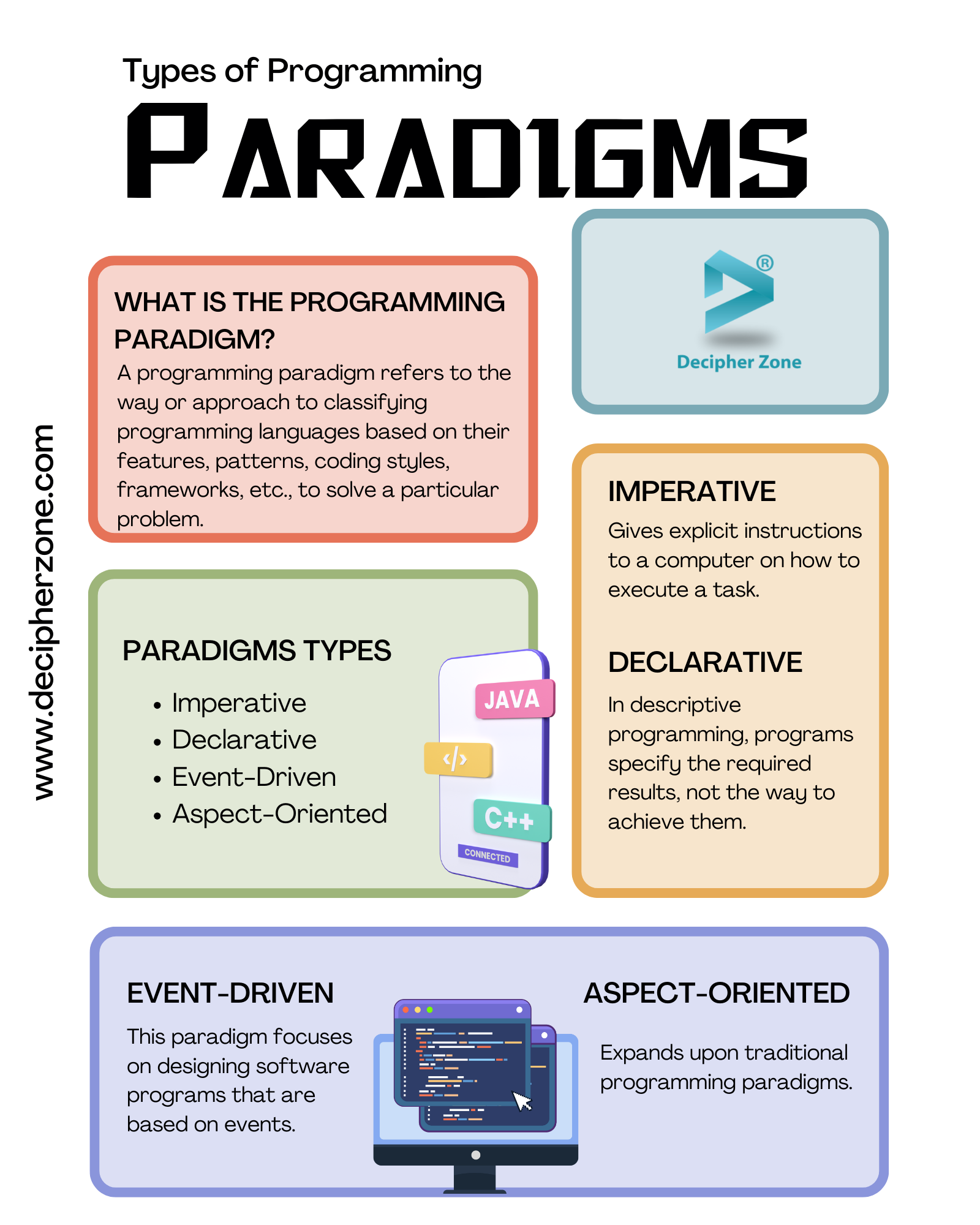What is the Programming Paradigm and It's Types. From the development of the first programming language to the improvement and emergence of newer ones, programming languages are continuously pushing the boundaries of what programming can be.
And if you are a programmer or someone interested in software development, you might have heard about ‘programming paradigms’.
But, wait what is it and what are its types? In this blog, we will break programming paradigms down and provide you with a more straightforward context about each.
What is the Programming Paradigm?
A programming paradigm refers to the way or approach to classifying programming languages based on their features, patterns, coding styles, frameworks, etc., to solve a particular problem.
In simple terms, it can be defined as a way of thinking and structuring the functionalities of a program. Most of the programming languages that are being used by software developers these days support multiple programming paradigms simultaneously.
Read: Top 5 Programming Languages, Tools & Technologies
Types of Programming Paradigms
Some of the popular types of programming paradigms are:
-
Imperative
-
Procedural
-
Object-Oriented
-
Declarative
-
Functional
-
Data-Driven
-
Logic
-
Event-driven
-
Aspect-Oriented

1. Imperative
Also referred to as algorithmic programming, it is a paradigm that gives explicit instructions to a computer on how to execute a task. It uses statements to change a program’s state. In imperative programming, functions are coded implicitly at each necessary level to resolve an issue.
Some of the popular imperative programming languages are C, C++, Java, Python, etc. Also, imperative programming doesn’t use pre-coded models. Some of its types are as follows:
2. Procedural
It is a type of imperative programming where a program is coded using one or more functions or procedures. Procedural programming is derived from structured programming that is based on the concept of procedures, also called subroutines, routines, and functions.
These procedures contain a series of computational steps that need to be performed. Major examples of procedural programming languages include BASIC, FORTRAN, COBOL, C, etc.
3. Object-Oriented
The object-oriented programming paradigm is based on the ‘object’ concept. These objects can consist of data and code rather than functions and logic. Here, data is in field format and code in procedure form.
These procedures are attached to objects, allowing easier access and data field modifications. Java, C++, C#, Python, Swift, Objective-C, Ruby, and PHP are a few examples of object-oriented programming languages.
Read: Common Data Structures for Programmers
4. Declarative
It is a high-level programming paradigm that is the opposite of imperative programming. In descriptive programming, programs specify the required results, not the way to achieve them. The declarative paradigm is further divided into functional, data-driven, and logical programming styles.
It expresses computation logic without describing its control flow. SQL, HTML, CSS, XAML, YAML, Haskell, and XML, are some most commonly used declarative programming languages.
5. Functional
It is a programming paradigm where programs are coded by applying and composing functions. Here the computation is treated as a mathematical function evaluation and developers evade changing mutable data and state.
Simply put, in functional programming, functions can be assigned to variables, returned from other functions, and passed as arguments. Some examples are Erlang, Haskell, Lisp, Scala, PureScript, Elixir, and more.
Read: What is Software Development
6. Data-Driven
In data-driven programming, the flow and behavior of a program are determined by data instead of hard-coded instructions. Here data is used to control the decision-making and logic of the program. A few examples of data-driven programming languages are Hadoop, SQL, R, and Python.
7. Logic
The logic programming paradigm uses a set of rules and facts, to describe constraints and relationships within a problem domain. Here rules are written as logical clauses and follow a declarative approach. This programming paradigm can be used to express knowledge without depending on the implementation.
Read: Top 10 Programming Languages for Desktop Apps
8. Event-driven
This paradigm focuses on designing software programs that are based on events. In the event-driven paradigm, asynchronous actions’ emitters and listeners are used. Here the entities communicate indirectly with each other by sending messages through an intermediary.
Instead of following a sequential or linear execution pattern, the control flow of the event-driven paradigm is determined by events and event handlers. Java with JavaFX and SWING, Python with Tkinter and PkQt, Objective-C, Unity, and more are some examples of event-driven programming languages in the market.
9. Aspect-Oriented
The Aspect-Oriented Programming paradigm (AOP) expands upon traditional programming paradigms like procedural programming, object-oriented programming, and functional programming. It complements object-oriented programming by separating software application concerns to enhance modularization.
AOP is largely used to manage cross-cutting issues due to code duplication and maintainability of the program in software systems. C++, .NET, Ruby, Spring AOP, AspectJ, etc. are some popular examples of aspect-oriented programming languages.
Read: How to Succeed in Learning Programming
Wrapping it Up
Each programming paradigm has its own ‘essence’ that one can only understand clearly by using it. And, without learning about each of these paradigms, it will be quite difficult to choose the programming language that supports the paradigm that works best for your application.
So that was all about programming paradigms and if you want to build a software app for your business but aren’t sure about the paradigm and language to opt for, then get in touch with our experts now! They will help you decide on the right solution according to your unique business needs.
FAQs: Types of Programming Paradigms
What are the types of paradigms of programming?
Imperative, Declarative, Event-Driven, Flow-Driven, and Aspect-Oriented are the major types of programming paradigms.
What is a programming paradigm?
A programming paradigm refers to the way or approach to classifying programming languages based on their features, patterns, coding styles, frameworks, etc., to solve a particular problem.





